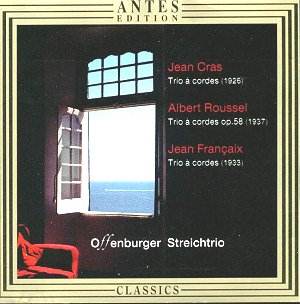These three French string trios make fascinating
disc-mates. Each demonstrates a degree of mastery over form; each
establishes a distinct sound and emotive world and each presents
a highly personalised response to the form. I suspect to collectors
it is Cras’s trio that will be the most immediately compelling.
Composed on board a warship in 1926 this is a work of profound
imagination written in four movements of unceasing skill. The
bold oscillations of the first movement lead onto a more overtly
impressionistic second subject, more indeterminate, though sweetly
contrasted with the brisk decisive flourish that surrounds it.
Everything here is driven by subtle rhythmic and colouristic plasticity
of the most rewarding kind. The Lento opens with a colour-glint
in the sun, which leads to the introduction of some Eastern European
folk elements – Balkan sounding – complete with drones and the
violins’ increasingly lyrical strangeness. All this drives the
viola to an agitated call to arms – and the movement continues
in this aspect of intensity, uncertainty and otherness to its
close. Cras introduces violin pizzicati in the third movement,
accompanied by an imitative "guitar" – there’s a torrent
of verve and vivacity here and developing power as well. The work
ends with a folk fugato of headstrong animation; a profusion of
energy courses through the movement, plentiful dynamics are observed
and the surge of drama sweeps all before it. This is a work you
must hear.
Following Cras’s ebullient and masterful Trio
Roussel’s may seem a mite reserved but don’t be fooled. This valedictory
work, his last completed composition, is a work of real power
and concision. Its Allegro Moderato opening movement opens with
clarity, linearity but also with melodic serenity and ends in
a neo-classicist cadence of summative significance. The heart
of the Trio is the Adagio, which spins thematic inter-relatedness
with utter precision but no hint of manipulation of material.
Instead there is a striving romanticism only partly obscured by
the strong chromaticism. One need not listen too hard to hear
those lamenting inner voices, or to wonder at the composer’s peaceful
affirmation of an ending, one that has been reached through powerful
engagement. And so he turns to his finale, a sweetly lyrical march,
each instrument almost comically exaggerated in terms of delicacy
and articulation, as if Roussel were biding us a satisfied and
knowing farewell.
Françaix’s Trio is a four-movement affair
of real charm. It opens with a lacy moto perpetuo with individual
melodic voices popping up, lots of pizzicati and scurry and wisps
of melody – short, sharp, very Françaix. The Scherzo that
follows is a boisterous affair with hints of a Mahler Ländler,
heavy leaning on beats and a mordantly satiric feel all round
but the Andante brings veiled reflection in almost brilliantly
strong – and quite deliberate – contrast. He signs off with a
rollickingly witty, exaggerated and high spirited Vivo Rondo;
back comes the Scherzo naughtiness, there are plenty of heavy
suspensions and a retarded, swing effect; unison droning and a
scampering rush to the finish and then, when we get there, an
insouciant pizzicato throwaway end.
Good, succinct notes and fine, incisive and thoughtful
playing from the Offenburg Trio whose recorded debut this was.
They prove worthy ambassadors for this wilful, complex and impressive
corpus of music.
Jonathan Woolf
